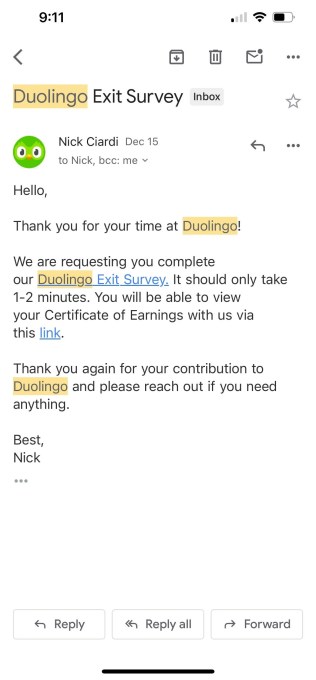
Duolingo is the latest company to cite AI as a reason for job cuts. The company confirmed it cut around 10% of its contractor workforce at the end of 2023, as it turns to AI models like OpenAI’s GPT-4 to streamline content production and translations.
The broad application of ChatGPT and other large language models could impact a wide range of job roles, including language-based tasks. According to the World Economic Forum’s 2023 Future of Jobs report, AI will transform 23% of jobs in the next five years.
Redditor No_Comb_4582 was the first to note the Duolingo layoffs, writing that they were offboarded as a contractor on December 15, with a screenshot of an email from the company attached to the post.

“The reason [Duolingo] gave is that AI can come up with content and translations, alternative translations, and pretty much anything else translators did. They kept a couple people on each team and call them content curators. They simply check the AI crap that gets produced and then push it through,” wrote No_Comb_4582.
A company spokesperson explained to us that GPT is used to translate sentences and then “human experts validate that the output quality is high enough for teaching and is in accordance with CEFR standards for what learners should be able to do at each CEFR level.” The Common European Framework of Reference for Languages (CEFR) is an international guideline for explaining language proficiency.
Duolingo also uses GPT-4 to power experiences for its premium subscription tier Duolingo Max, including AI-generated feedback and a chatbot to help users practice conversations. Duolingo also has its own proprietary AI model, “Birdbrain” that personalizes lesson content.
However, the company disputed calling the departures “layoffs,” saying that only a “small minority” of Duolingo’s contractors were let go as their projects wrapped. A spokesperson also cited various reasons that could be the case, like a contract being completed, or “improvements to content creation operations” that no longer require as many people to do the work. In a comment to Bloomberg, the company also confirmed that part of the reason it no longer needed as many people was attributable to AI.
Understandably, both the contractors and Duolingo users were upset by the job cuts, as it adds to the ever-growing fear that AI will replace human workers. It’s an especially tough blow for contractors, who already experience job insecurity going from one assignment to the next, and often struggle to find permanent jobs due to their spotty resumés.
In an X post, @bvnnyjungkook said she was a contractor for Duolingo and noted that a majority of its workforce are contractors, which is usually a sign that a company wants to save money because they don’t have to factor in insurance obligations or benefits like paid time off and sick leave.
Duolingo had 600 full-time employees in 2022, per company filings.
i was a duolingo contractor for 2 years and it was always clear to me that they love AI and that they take advantage of the fact that a majority of their workforce are contractors (ie no benefits or job security) :/ https://t.co/A9Ddx6aLMv
— jade (@bvnnyjungkook) January 8, 2024
Plus, Duolingo users worry that AI translations may take away the value of a human expert who has a deeper understanding of languages, idiomatic expressions and cultural nuances.
Duolingo laid off a huge percentage of their contract translators, and the remaining ones are simply reviewing AI translations to make sure they’re ‘acceptable’. This is the world we’re creating. Removing the humanity from how we learn to connect with humanity. pic.twitter.com/YdT6CTB3Kj
— Reid Southen (@Rahll) January 8, 2024
Duolingo launches new subscription tier with access to AI tutor powered by GPT-4
